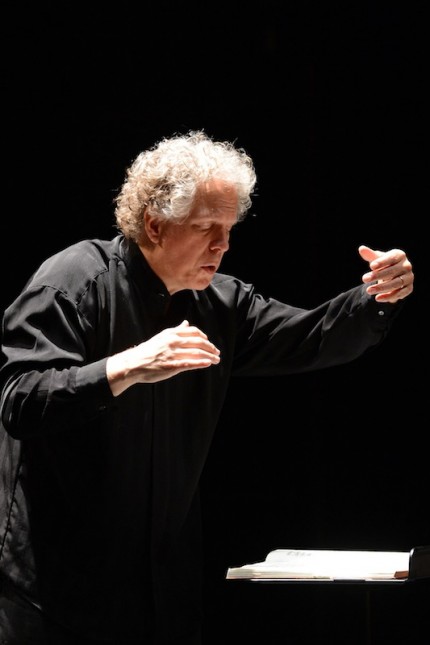Without Nelson at the helm, Mass in B minor proves a mixed bag of Bach

On Friday evening, the Chicago Bach Project’s performance of Bach’s Mass in B minor completed another cycle of the so-called Bach “trilogy,” the second since the series began in 2011.
The evening led off with the only other piece on the program: the U.S. premiere of a setting of Laudate (Psalm 150) by the contemporary Welsh composer John Metcalf. This a cappella work was performed by the Chicago Bach Choir alone, under the direction of Donald Nally.
Unlike most settings of the Laudate, which project jubilation above all, Metcalf’s is a ruminative work. Though mostly consonant, its voicings are rich and varied enough to be compelling. The choir’s performance was simply superb. Each harmony was fastidiously tuned, and their wide dynamic range lent dramatic power to the piece.
Delta David Gier conducted the choir and the Chicago Bach Orchestra in the mass, stepping in at short notice for John Nelson, who is suffering from pneumonia.
The Kyrie section boded poorly for the mass. The opening intoning of the words “Kyrie” had little power. Balances were badly off in the first-movement fugue with instrumental entrances nearly indiscernible. When it came time for the choir to take up the fugue, they began with only one or two singers to each part, gradually filling out each section as the movement went along. This was a fine idea in theory, except that the soloists failed to project, and were covered by the orchestra. Gier’s quirky shaping of the instrumental parts made for a herky-jerky “Christe Eleison” movement.
Things improved somewhat in the Gloria: counterpoint was still not clear and dynamics still inhibited. But Gier’s attention to rhythm made for an ebullient “Gloria in excelsis deo” and his blazing “Cum Sancto Spiritu” brought the first half of the concert to a whirlwind conclusion.
Something must have happened over the intermission, as the entire Credo section was outstanding, as were the choral movements of the Sanctus. Gier’s rhythmically pinpointed approach worked wonders throughout the central three movements—“Crucifixus”, “Et resurrexit,” and “Et in Spiritum Sanctum Dominum”—taken at nicely flowing tempos, with expressive phrasing. Gier and the choir did full justice to the playful dialogue that opens the “Confiteor unum baptisma” and the quiet mystery that ends it.
The four vocal soloists were soprano Kathryn Lewek, mezzo Margaret Lattimore, tenor John McVeigh, and bass-baritone Daniel Okulich.
McVeigh paired well with Lewek in the “Domine Deus.” In the “Benedictus,” he displayed a tone that while generally attractive, seemed to harden uncontrollably on close vowels. Lewek delivered a somewhat plain-faced but nonetheless pleasant “Laudamus Te.”
The best solo singing of the night came from Lattimore and Okulich. Okulich’s dark-toned “Quoniam tu solus Sanctus” contrasted nicely with his light-toned and fresh “Et in Spiritum Sanctum Dominum.” The latter was set off by the graceful oboe d’amore playing of Peggy Michel and Jennet Ingle, who provided tasteful solos throughout the evening.
Lattimore’s solo singing was the most consciously “interpreted”—filled with changes of dynamics and color to inflect the text. This was particularly evident in her dramatic rendition of “Qui sedes ad dextram Patris.”
A majestic account of the “Dona nobis pacem” closed what was half of an excellent performance of the mass.
Posted in Performances




